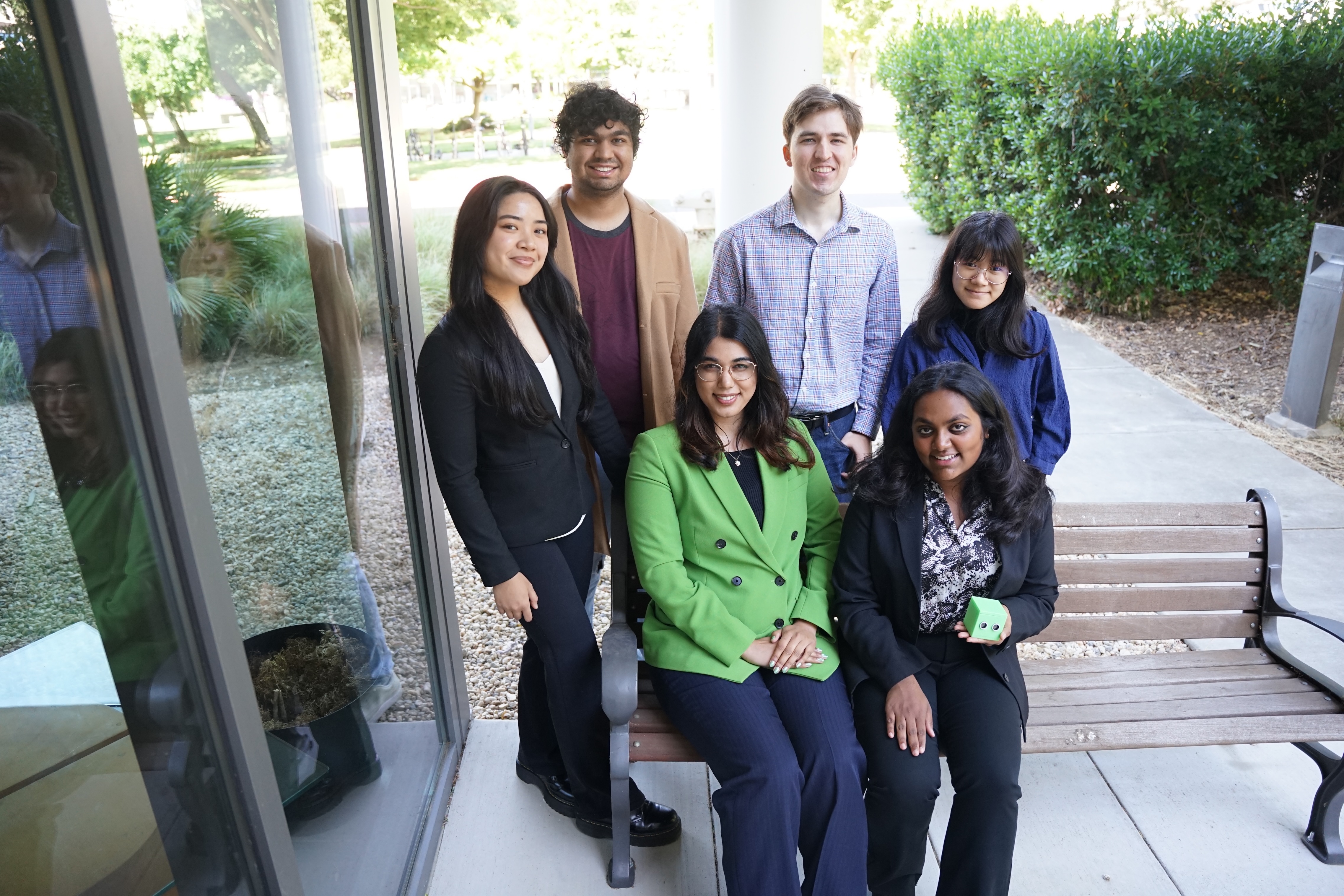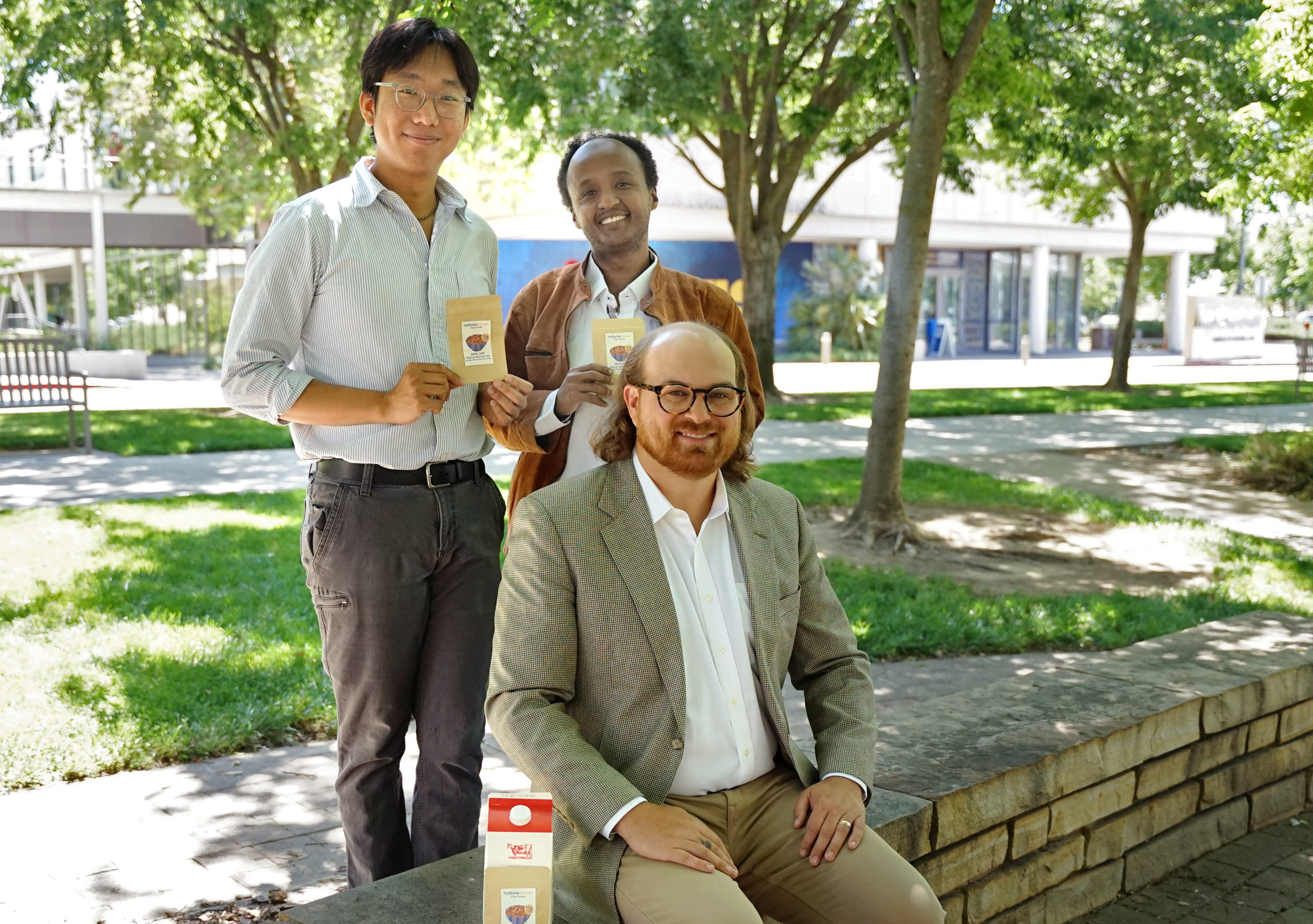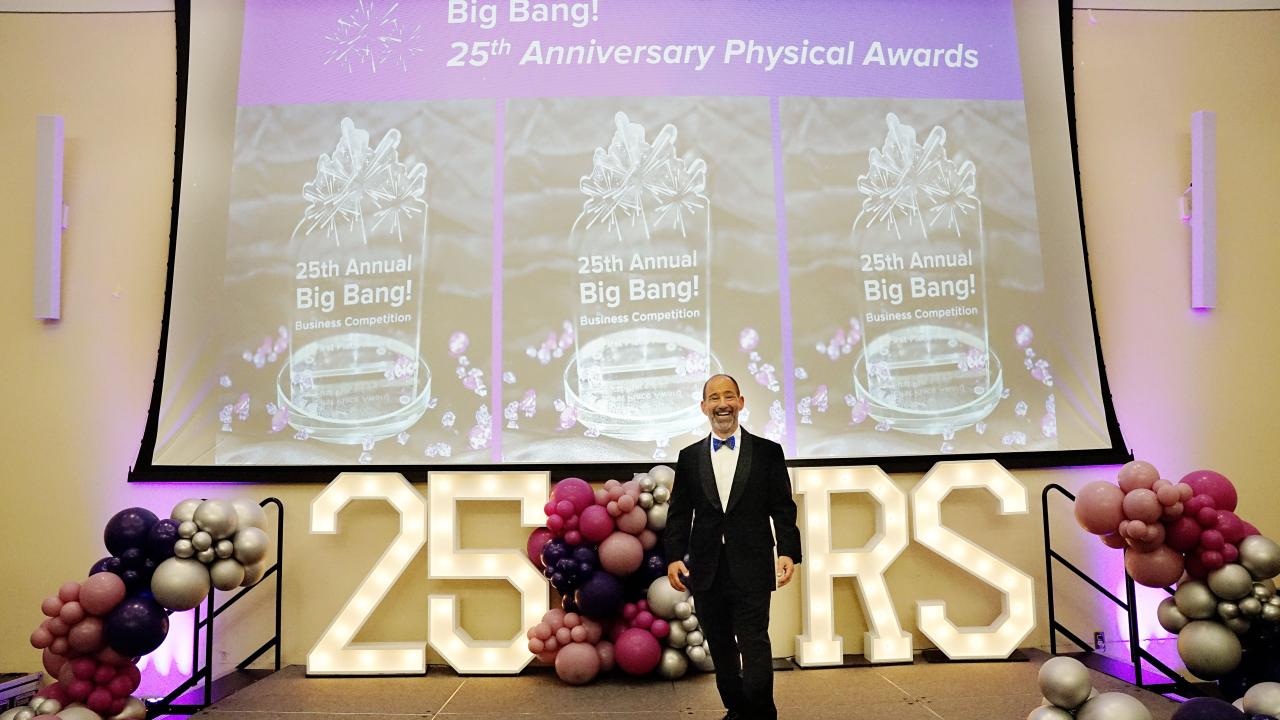This year marks the 25th annual Big Bang! Business Competition, organized by the Mike and Renee Child Institute for Innovation and Entrepreneurship at the University of California, Davis, which awarded over $100,000 in grants to the winning teams on Tuesday.
A team of undergraduate students from California Institute of Technology won this year’s $25,000 first prize for an innovation that provides real-time data on livestock health, helping farmers prevent costly disease outbreaks. Pasadena-based Nexa Labs has developed a subcutaneous biosensor that monitors herd health by tracking heart rate, respiration rate, blood oxygen and temperature. Farmers receive continuous data, including alerts for any potential disease outbreaks.
“This is an incredibly important issue because, worldwide, farmers lose more than $350 billion annually to livestock health issues,” said Zarif Azher, co-founder and CEO of Nexa Labs and Caltech undergraduate bioengineering major. “In the U.S., 70% to 90% of farms currently monitor their cattle health through manual inspection. This subjective process cannot catch health issues until they have already started spreading through a herd, causing massive losses.”
Other biosensing devices include ear tags and collars, but Azher said these provide less actionable data because they sit outside the body.
Nexa Labs’ technology targets bovine respiratory disease, the most common and costly cattle health issue. Future versions of the technology will detect a wider range of health concerns and may eventually be available for use with humans. Azher said Nexa Labs will use the Big Bang! prize money to increase the scale of its technology validation trials, set to begin at partner universities in the coming months.
Other members of the Caltech-based undergraduate team are CTO Alvin Zhang (electrical engineering and computer science), CFO Kenneth Chan (applied and computational mathematics and computer science) and COO Kyle Berkson (applied and computational mathematics and computer science).
Twenty-five years of Big Bang!
Since 2000, the UC Davis Big Bang! Business Competition has been supporting entrepreneurs as they develop their business ventures. The competition kicks off each fall and offers business workshops, mentoring and networking opportunities throughout the winter and spring. Seventy-five teams entered the competition this year. Nineteen teams were selected for the third and final round and pitched their ventures before five judges in an eight-hour marathon judging session. To determine prize winners, judges considered each team’s integrated strategy, steps toward implementation and market opportunity.
The Big Bang! is open to teams with a founder or team lead affiliated with a college or university in California. The prizes are funded by corporate, university, nonprofit and various other sponsors.
The annual awards ceremony celebrated the contestants and announced the winners of $100,000 in cash awards and residencies valued at $15,000. A total of $25,000 is awarded to the first-prize team, as well as $12,500 for teams in each sector: animal health and industry, education and educational tools, energy and sustainability, food and agriculture, human health and industry, and social entrepreneurship.

The Make Box makes STEM education more accessible
Davis-based The Make Box is the product of team founder Kavya Khare’s passion for hands-on STEM learning that began during her middle school years. Khare, a UC Davis electrical engineering major, saw the same excitement at STEM summer camps, when students were able to explore and build. She realized that most children lack access to accessible, creative and engaging STEM tools, especially when they don’t see themselves represented in traditional STEM pathways.
The Make Box team developed their flagship product, SnapBots, as a modular robotics kit that includes programmable cubes with different functions, such as light sensing and sound activation that snap together with magnetic connectors. Children can follow instructions to build standard bots, such as an alarm bot, or they can invent new creations with the drag-and-drop coding interface.
Members of the Make Box team took home the $12,500 Education and Educational Tools sector award, which they plan to use to offer free workshops and pilot programs for SnapBots in local schools.
The UC Davis undergraduate team includes robotics engineers Luuanne Chau (computer engineering), Aryan Mondkar (mechanical engineering), Ahsab Alabedin (electrical engineering), Henry Poole (electrical engineering), and Maxine Genove (electrical engineering); lead marketer Avantika Varma (computer engineering); marketer Suhani Khanna (mathematics); and graphic designer Mallika Joshi (design).

Ancient grains for better health
UC Davis Ph.D. student Ali Said Yusuf was diagnosed with prediabetes in 2023, joining 100 million Americans with the condition. He needed to increase the fiber in his diet to control blood sugar spikes, so he developed a breakfast cereal made from teff, an ancient grain from East Africa.
“I began eating teff porridge every morning, which kept me full for hours,” Yusuf said. “Within a year, I reversed my pre-diabetes, lost over 30 pounds and regained control of my health.” Yusuf co-founded Davis-based Teflishe Foods, which took home $12,500 for the Food and Agriculture sector award.
Yusuf said that 95% of Americans do not meet their daily recommended fiber intake. Teff-based products can help consumers increase their fiber intake through real food, starting with this newly developed breakfast cereal that delivers 60% of the daily recommended fiber. The cereal offers 15 grams of fiber per serving and no added sugar.
“Our goal is to provide a natural, delicious and culturally rooted way to improve fiber intake and support the prevention and management of prediabetes, diabetes and related health conditions,” Yusuf said.
The Teflishe team includes Yusuf and co-founder Will Hazzard, both UC Davis Ph.D. candidates in horticulture and agronomy, and Zhenglin Zhang, a UC Davis Ph.D. graduate in horticulture and agronomy and postdoctoral scholar at Stanford University.
Other winners
An additional $50,000 in cash prizes was awarded Tuesday to teams with innovations in social entrepreneurship, human health, energy and sustainability, and animal health.
Buzzit of Davis: A student-first marketplace that helps college students monetize their skills and find affordable, peer-provided services. Social Entrepreneurship sector award, $12,500. Founder and CEO Parinita Gupta: UC Davis undergraduate (cognitive science); app developer Cyrus Foroudian, UC Davis undergraduate (computer science); app developer Shota Ruo: UC Davis undergraduate (computer science); marketing analyst Rayan Narynaswamy: UC Davis undergraduate (cognitive science); marketing analyst Krishna Hajari: UC Davis undergraduate (data science and managerial economics); product manager and designer Harsh Sangani, product owner at Equifax, Alpharetta, Georgia; product designer Vedika Nimbalkar: Rochester Institute of Technology graduate student (human computer interaction); business strategy advisor Nagendra Prahlad, DocuSign, San Jose, Calif.
Everest Medical LLC, of San Luis Obispo, Calif.: A single-use device to treat shoulder dystocia during childbirth, blending successful midwifery and obstetric techniques into a standardized tool and enabling providers to treat this emergency effectively and efficiently. Human Health and Industry award, $12,500. CEO and co-founder Jenna Eissmann, Cal Poly graduate student (engineering management); CFO and co-founder Madeleine Mumford, Cal Poly graduate student (biomedical engineering).
Splash Tech of Davis: An automated pool chemical monitoring and management system. Energy and sustainability sector award: $12,500. CEO Rain Sun, UC Davis graduate student (electrical engineering); CFO Gabriel Sigala, Sacramento State undergraduate (business administration); designer Jeremy Randall, UC Davis undergraduate (design).
Vet Scientia of Davis: A cloud-based virtual simulation focused on anesthesia management training. Animal Health and Industry Award, $12,500. Co-founder and educational advisor Morgan Lunn, UC Davis veterinary science student; co-founder and veterinary advisor Raffy Dorian, DVM, UC Davis graduate, managing partner and chief veterinary officer at Vetma and Central Coast Veterinary Services; collaborator Marcela Machado, DVM, assistant anesthesiology professor at UC Davis School of Veterinary Medicine; software developer Lindsay Lanstad, Cal Poly undergraduate (software engineering).
The competition also awarded three residency awards with a combined estimated value of $15,000:
- The Make Box: Laboratory space at startup incubator Inventopia with an estimated value of $5,000.
- Teflishe Foods: Laboratory space at startup incubator AgStart with an estimated value of $5,000.
- Orchard Eye: Using weather balloons with thermal infrared cameras, Orchard Eye can detect leaks in orchard irrigation systems. Laboratory space at startup incubator HM Clause with an estimated value of $5,000. Founder Harshpratap Singh, UC Davis undergraduate (biology); and software and tech developer Ishaan Dhaliwal; research and development officer Guntas Singh; hardware designer Rohandeep Singh; communications officer Pranvat Singh; chief of marketing Simar Singh, all Davis Senior High School students.
Media Resources
Media Resources: Finalist pitch videos
Media contacts:
- Angela Lindley, Mike and Renee Child Institute for Innovation and Entrepreneurship, alindley@ucdavis.edu
- James Nash, UC Davis News & Media Relations, jnash@ucdavis.edu
